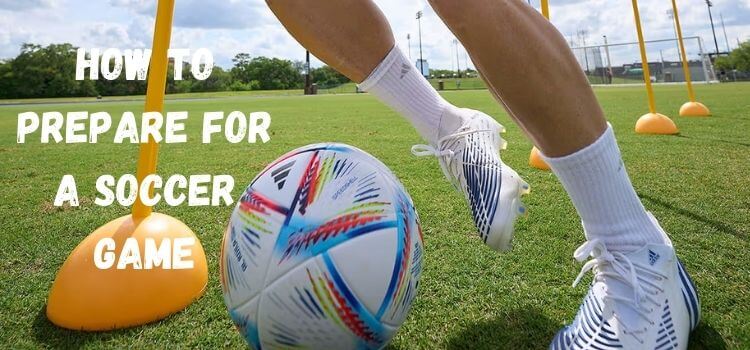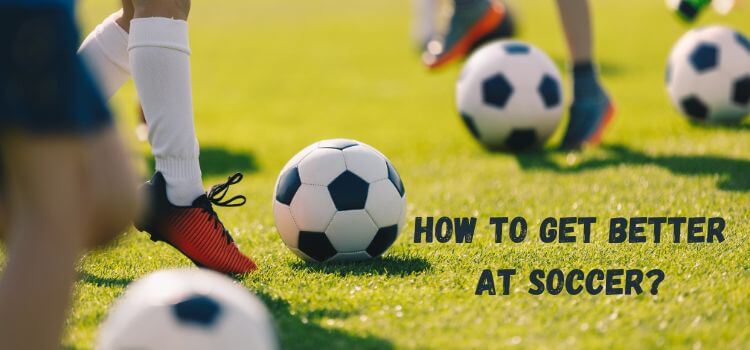As an Amazon Associate, I earn from qualifying purchases
When it comes to soccer, preparation is everything. How you prepare for a soccer game can make all the difference in the world, no matter how experienced you are. All of the crucial tactics to make sure you perform at your peak on game day will be covered in this guide. From physical conditioning to mental focus, we’ve got you covered. Let’s dive in!

Physical Preparation
Conditioning and Fitness
Cardiovascular fitness is essential for success in soccer. Your body needs to keep up with the constant movement, and a strong heart and lungs are important. Incorporate aerobic exercises like running, cycling, and swimming into your routine.
Additionally, strength training is vital. Engage in exercises such as lunges, push-ups, and squats to concentrate on developing muscle in your upper body, legs, and core.
Diet and Nutrition
Your performance might be significantly impacted by what you eat before a game. You can get all the energy you need from a well-balanced meal high in healthy fats, proteins, and carbohydrates.
A pre-game meal three to four hours before kickoff should consist of vegetables, lean protein (like fish or chicken), and complex carbohydrates (like pasta or rice). Don’t forget hydration – start drinking water early and sipping throughout the day.
Rest and Recovery
Never underestimate the power of a good night’s sleep. Aim for 7-9 hours of quality rest before game day. Add stretching and flexibility exercises to your daily regimen to keep your muscles fluid and avoid injuries. Foam rolling and yoga can be particularly beneficial.
Mental Preparation
Visualization Techniques
Mental imagery can be a game-changer. Spend some time each day visualizing successful plays and scenarios. This builds confidence and mentally prepares you for various situations on the Field. Imagine yourself scoring goals, making key passes, and defending effectively.
Focus and Concentration
Staying focused is essential. Maintaining focus can be facilitated by practices such as mindfulness and deep breathing. Practice these regularly so that when game day arrives, you can focus on the task and avoid distractions.
Handling Pressure
Soccer games can be stressful, but handling pressure is a skill you can develop. Develop your ability to remain composed by engaging in stress-reduction activities like meditation and encouraging self-talk. Remind yourself of your prior achievements and have faith in your skills.
Tactical Preparation
Understanding the Opponent
Knowing your opponent gives you a strategic edge. Research their strengths and weaknesses by watching their previous games. Identify key players and common strategies they use. With this knowledge, you can adjust your plan and exploit their weaknesses.
Team Strategy and Formation
Discussing tactics with your team is crucial. Understand the formation you’ll use and each player’s role within that setup. Having open lines of communication on team strategy guarantees that everyone agrees and pursues the same objectives.
Equipment and Gear
Proper Footwear
Choosing the right soccer cleats is essential for performance and injury prevention. Make sure your cleats fit well and are appropriate for the field conditions. Take your time breaking in new shoes to prevent blisters and soreness.
Protective Gear
Never skimp on protective gear. Shin guards are a must to protect against injuries. Consider additional gear like ankle supports or padded shorts, depending on your position and preference.
Game Day Routine
Pre-Game Warm-Up
Proper warm-ups prepare your body for the intense activity of a soccer game. To get your blood flowing, combine modest cardio activities with dynamic stretching. Avoid static stretching until after the Game to prevent muscle strains.
Mental Focus on Game Day
Develop pre-game rituals to get into the right mindset. This could be listening to music, meditating, or visualizing your performance. Continue to be upbeat and remind yourself of your abilities and readiness.
Arrival at the Venue
Arriving early at the venue has multiple benefits. It lets you get comfortable with the Field, check the conditions, and complete a thorough warm-up without feeling rushed. Plus, it helps reduce pre-game anxiety.
During the Game
Staying Hydrated
Hydration is critical during a soccer game. Drink water at regular intervals to keep your body functioning optimally. Fatigue and poor performance are two consequences of dehydration.
Communication on the Field
Being able to communicate well with your coworkers can have a significant impact. Call out plays, encourage, and give constructive feedback. This keeps everyone aligned and can change the course of the Game.
Adapting to Game Situations
Flexibility in strategy is essential. Prepare to change your strategy as the soccer game progresses. Whether changing your position, altering your tactics, or adapting to the opponent’s moves, staying responsive is critical.
Post-Game Recovery
Cool-Down Routine
After the Game, a proper cool-down helps your body recover. Engage in light cardio followed by static stretching to relax your muscles and prevent stiffness.
Nutrition and Hydration
Post-game nutrition is just as crucial as pre-game. Eat a meal rich in protein and carbs within two hours of the Game to aid muscle recovery. Continue to hydrate, replacing lost fluids with water or sports drinks.
Reflecting on the Game
Take time to reflect on your performance. Analyze what went well and where you can improve. You can grow from your experiences and prepare for the soccer game by reflecting on them.
Conclusion
Physical, mental, and tactical strategies must be used to prepare for a soccer game. Following these tips will enable you to perform at your best. Recall that the secret to success on the Field is preparation. Put on your cleats, concentrate, and get ready to rule the Field!
FAQs
Consuming a balanced meal three to four hours before the Game would allow for adequate digestion.
Good pre-game meals include pasta with chicken, rice with vegetables, lean meat, or a hearty sandwich with whole grain bread, turkey, and veggies.
Improving focus can be achieved through regular practice of mindfulness techniques, visualization, and deep breathing exercises.
If you feel nervous, try deep breathing, positive self-talk, and visualization to calm your nerves and build confidence.
Team communication is crucial. It ensures everyone is coordinated, helps make quick decisions, and boosts team performance.
Read Our More Articles
- How Long Can You Play Soccer While Pregnant? Get Facts Here
- Why Can’t You Take Off Your Shirt in Soccer? A Closer Look
- What to Do Before Soccer Game: Tips and Tricks
As an Amazon Associate, I earn from qualifying purchases


